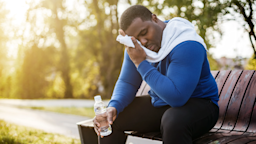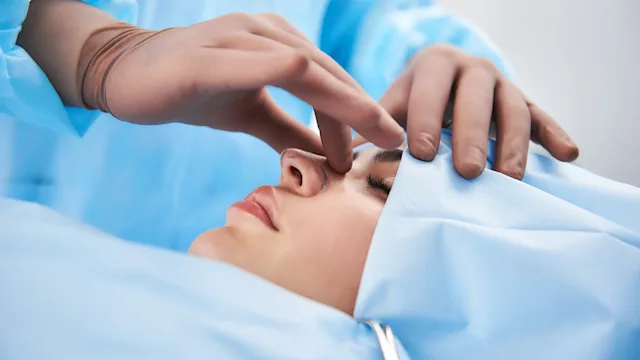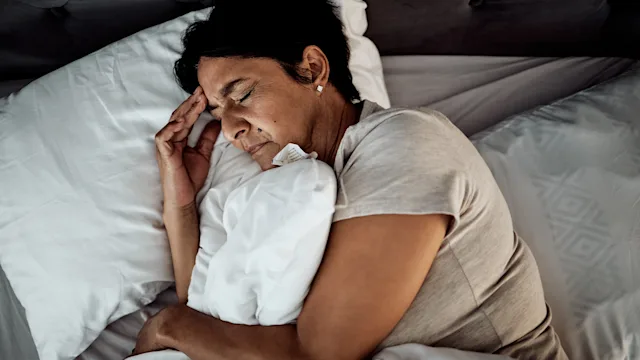Key takeaways:
Night sweats are episodes of unusually heavy sweating that occur while sleeping. They typically cause someone to wake up with wet pajamas and/or sheets.
Night sweats aren’t always a cause for alarm. They can just be caused by a warm room, heavy sleepwear, or too many covers on your bed.
Other common causes of night sweats include stress, hormonal changes (including menopause), infections (like the common cold), and over-the-counter medications.
Sometimes night sweats may be a sign that something more serious is going on. Other new symptoms can help you decide if you should see a healthcare professional.
Waking up in a pool of sweat is a relatively common experience that people refer to as “night sweats.” In most cases, night sweats aren’t a health concern. Usually, they happen because the room is too hot or the bedding is too heavy. But, every now and then, night sweats are a sign of an underlying health condition.
We’ll explain the most common causes of night sweats — and how to know if you should see a healthcare professional to find out if anything more serious is going on.
What causes night sweats?
Night sweats are sometimes a sign of an underlying condition, but they often have nothing to do with a person’s health. They may be a natural response to the changes that happen when you sleep. Below, we review the most common night sweat causes.
Search and compare options
1. Sleepwear
Your pajamas may be causing you to overheat at night. This is especially true if your pajamas have long sleeves or if they’re made from a heavier material, like fleece or flannel.
2. Sleep environment
When you picture going to sleep, you might imagine curling up in a warm and cozy bed. Nestling under a heap of covers can actually help you fall asleep. But, if you like a heavy blanket, it’s important to keep the room temperature cold (65°F to 68°F is the ideal range) to avoid sweating overnight.
3. Medications
Many medications may cause excessive sweating and lead to night sweats, including:
Medications that help bring down fevers, like acetaminophen (Tylenol) and ibuprofen (Advil)
Steroids, such as prednisone
Certain antidepressants, like amitriptyline, duloxetine, and venlafaxine
Medications for diabetes, like insulin and pioglitazone
4. Menopause
Hot flashes can occur at night while you’re sleeping. These are common during menopause or perimenopause, the period of time around menopause when a person’s body starts changing in preparation for menopause.
5. Menstruation
A decrease in estrogen can cause the body to be more sensitive to temperature changes. This hormone change happens right before and at the start of a person’s menstrual period. And it may cause some people to experience night sweats.
6. Stress and anxiety
The body’s natural stress response can result in sweating — and this sweating may happen at night. Stress and anxiety can cause an overactive mind and body, even when you’re asleep, which can result in different physical symptoms.
Looking for night-sweat relief? Here are some proven ways to beat night sweats and stay cool at night.
Medications and night sweats: Find out which common medications may contribute to night sweats.
Night sweats from perimenopause: Learn more about how perimenopause can leave you drenched at night and disrupt your sleep.
7. Infection
A routine infection, like the common cold, can cause a fever that leads to night sweats. But some rarer infections can also cause night sweats. Some examples include:
HIV (human immunodeficiency virus)
Tuberculosis
Osteomyelitis (infection of the bone)
Abscesses
Having night sweats from a fever doesn’t necessarily mean that you have one of these infections. If you have a fever, talk with a healthcare professional to determine the source of the fever.
Read more like this
Explore these related articles, suggested for readers like you.
8. Hyperthyroidism
The thyroid is a gland in the body that helps maintain body temperature. When it’s overactive in hyperthyroidism, it can heat up the body more than usual. This can lead to night sweats. Hyperthyroidism is diagnosed with a blood test. Make sure to visit a healthcare professional if you have unexplained night sweats or think you may be at risk for thyroid disease.
9. Chronic acid reflux
Gastroesophageal reflux disorder (GERD) is a common condition that can lead to heartburn, chest pain, and sometimes a hoarse voice and cough. GERD symptoms are often worse at night, when you’re lying flat. Some studies show GERD can also cause night sweats.
10. Sleep apnea
Sleep apnea is a condition that causes a person to temporarily stop breathing while asleep. Case reports suggest that this condition can lead to night sweats. If people tell you that you’re a heavy snorer or gasp for air while sleeping, you may be at risk for sleep apnea.
11. Sweating disorder
Hyperhidrosis is a rare but harmless condition that makes a person sweat excessively, both during the day and at night. There are effective treatments for this condition, so don’t be embarrassed to let a healthcare professional know if you’re very sweaty.
12. Autoimmune disorders
Night sweats can sometimes be a symptom of autoimmune disorders. Some examples include:
13. Autonomic neuropathy
Autonomic neuropathy is caused by damage to the nerves that control the involuntary functions of your organs, like sweating. Conditions that can lead to autonomic neuropathy include diabetes and Parkinson’s disease.
14. Alcohol use disorder
Alcohol can increase the size of your blood vessels. This can lead to increased sweating, especially if you drink alcohol before going to bed or drink heavily.
15. Substance use disorder
Addictive substances, like cocaine and heroin, can interfere with the body’s ability to regulate temperature and may cause night sweats.
16. Cancer
Cancer is a much less common cause of night sweats. But certain cancers are known to cause night sweats, including:
17. Low blood sugar
Dangerous drops in blood sugar — called hypoglycemia — often lead to a cold sweat. People with diabetes may experience episodes of hypoglycemia at night due to:
Their medications, including both insulin and oral medications (This can be because of the timing of their medications or taking too high of a dose.)
Not eating enough in the evening
Alcohol use
Illness
Low blood sugar at night is less common in people without diabetes, but it’s still possible. It can happen to people who have:
Anorexia
A history of bariatric surgery
Heavy alcohol intake
Severe illness, like sepsis
Routine use of certain medications, like beta blockers or ACE inhibitors
18. Increased body fat
Body fat naturally generates heat. When this heat is trapped beneath blankets at night, it can lead to night sweats — especially if you’re not awake to realize that you’re getting hot and need to remove clothing or covers. Increased body weight may also contribute to night sweats, given that sleep apnea is more common in people diagnosed with obesity.
What to do if you have night sweats
Waking up in a pool of sweat is an unpleasant feeling. And it can disrupt your sleep. If you find yourself waking up with night sweats, here are some things you can try to help get rid of them:
Dress in light sleepwear. Pajamas should be loose, light, and breathable. Avoid flannel or fleece, and choose short sleeves and shorts instead of longer pajamas.
Remove blankets. Avoid heavy or down comforters. Use only a sheet or sleep on top of the covers.
Lower the temperature in the room. The recommended temperature for sleeping is between 60°F and 67°F. If possible, try adjusting your air conditioner at night to this setting.
Open a window. If you don’t have air conditioning, open any windows that are in the room. This can help circulate air and keep the room cooler.
Use a fan. Strategically placed fans that rotate and blow cool air directly toward you can help keep you cool as you sleep.
When should you get care for night sweats?
Sometimes night sweats can be a sign that there’s something else going on. Pay attention to other symptoms that seem new to you. See a healthcare professional if you’re also experiencing:
Fever
Excessive tiredness
Cough or shortness of breath
Unintentional weight loss
Rashes
Nail changes (long, red streaks underneath the nail)
New pain
Excessive fatigue
Even if you don’t have any of the above symptoms, it’s still a good idea to see a healthcare professional if you’re experiencing night sweats that won’t go away. This is especially the case if you’ve followed the suggested tips and things aren’t getting any better.
Frequently asked questions
Night sweats aren’t always a red flag. In fact, most of the time they aren’t serious. But, sometimes, night sweats are due to an underlying illness. Some of the more serious conditions that cause night sweats include infections (like HIV) or cancer (like lymphoma). That’s why it’s a good idea to let a healthcare professional know if you’re having night sweats that won’t go away.
Yes, both long-term and short-term anxiety has been linked to night sweats. This may be because elevated stress hormones can have an impact on sweat glands. If you think you may have anxiety, talk with a healthcare professional about how to manage it effectively. Night sweats are just one of the many ways anxiety can impact your physical health.
Night sweats are nonspecific. In some cases they can be an indicator of infection, hormone changes, or medical conditions. Sometimes, they’re just the result of heavy blankets and nightclothes. Every now and then, the cause of someone’s night sweats is never figured out.
Some of the causes of night sweats in men include:
Medication for diabetes, heart disease, and depression
Fever and infections
Hormone changes (like low testosterone or high thyroid hormone)
Alcohol and substance use
Steroids
Increased body weight
Sleep apnea
Stress and anxiety
Cancer
Night sweats aren’t always a red flag. In fact, most of the time they aren’t serious. But, sometimes, night sweats are due to an underlying illness. Some of the more serious conditions that cause night sweats include infections (like HIV) or cancer (like lymphoma). That’s why it’s a good idea to let a healthcare professional know if you’re having night sweats that won’t go away.
Yes, both long-term and short-term anxiety has been linked to night sweats. This may be because elevated stress hormones can have an impact on sweat glands. If you think you may have anxiety, talk with a healthcare professional about how to manage it effectively. Night sweats are just one of the many ways anxiety can impact your physical health.
Night sweats are nonspecific. In some cases they can be an indicator of infection, hormone changes, or medical conditions. Sometimes, they’re just the result of heavy blankets and nightclothes. Every now and then, the cause of someone’s night sweats is never figured out.
Some of the causes of night sweats in men include:
Medication for diabetes, heart disease, and depression
Fever and infections
Hormone changes (like low testosterone or high thyroid hormone)
Alcohol and substance use
Steroids
Increased body weight
Sleep apnea
Stress and anxiety
Cancer
The bottom line
Night sweats are common and usually temporary. You can try some simple changes to keep yourself cool at night, like wearing light pajamas, ditching the comforter, and keeping your bedroom at a cool temperature.
But, if you’re having other symptoms that are new or unexplained, talk with a healthcare professional. In some cases, night sweats can mean something more serious is going on.

Why trust our experts?


References
Breus, M. J. (2024). Night sweats: Causes and treatments. Sleep Doctor.
Healthdirect. (2024). Night sweats.
Mold, J. W., et al. (2012). Night sweats: A systematic review of the literature. Journal of the American Board of Family Medicine.
National Health Service. (2023). Night sweats.
National Institute of Diabetes and Digestive and Kidney Diseases. (2018). Autonomic neuropathy. National Institutes of Health.
Pacheco, D., et al. (2024). The best temperature for sleep. Sleep Foundation.
Summer, J. V., et al. (2025). Night sweats in women: Causes, remedies, and tips. Sleep Foundation.
Tschinkel, A. (2021). Why am I so sweaty around my period? Shape.
Wynn, P. (2022). Night sweats: What you need to know. U.S. News.


















